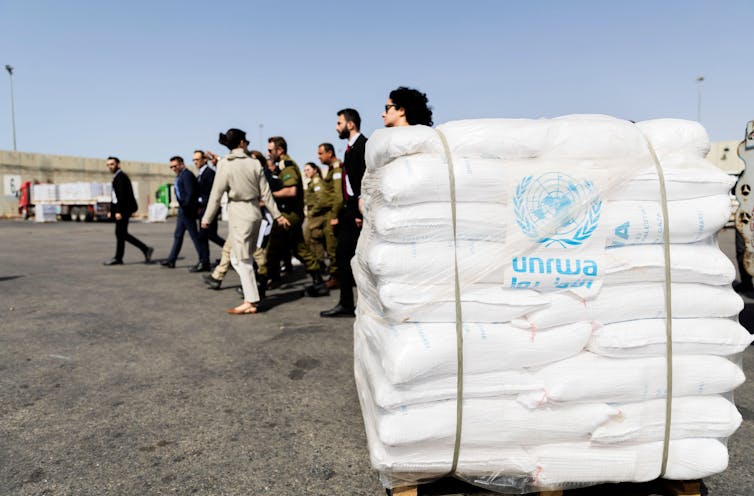Germany has become the latest country to resume its funding to Unrwa, the United Nations agency that provides essential relief services to nearly 6 million Palestinian refugees. The decision came after an independent review found no evidence to support Israel’s claim that the agency has been infiltrated by Hamas.
Germany is the agency’s second-biggest funder – and the move is especially striking in view of its extremely close political alignment with Israel, which is now coming under increasing strain.
All eyes are now on the US, the agency’s largest supporter, to see if it will reinstate the US$350 million (£280 million) it typically provides each year. Meanwhile in the UK, MPs have written to foreign minister David Cameron, demanding that funding is restored “without delay”.
Reaction from the Israeli government has been hostile. In a statement, Israel’s foreign ministry spokesman said that “this is not what a true and comprehensive investigation looks like”, adding “it is impossible to say where Unrwa ends and Hamas begins”. The Israeli government did not provide any further detail or evidence for this claim.
Israel alleged in January that 12 of Unrwa’s 13,000 employees in Gaza had participated in the October 7 attacks. Shortly afterwards, the government went on to claim that hundreds of Unrwa employees are members of Hamas or Islamic Jihad, in breach of the UN’s neutrality principles.
In response, Unrwa commissioner-general Philippe Lazzarini immediately fired nine of the accused 12 (of the other three, two are dead and one is missing). Meanwhile, the UN secretary-general, António Guterres, ordered an independent review into Unrwa’s neutrality practices.
That review was chaired by former French foreign minister Catherine Colonna and carried out by staff of Nordic research bodies – the Swedish-based Raoul Wallenberg Institute of Human Rights and Humanitarian Law, the Norwegian Chr. Michelsen Institute and the Danish Institute for Human Rights.
The report makes good reading for Unrwa. Colonna and her team described its work as an “indispensable lifeline” for Palestinians and noted the agency’s robust neutrality framework.
Crucially, they also found that Israel has provided no evidence for its allegations that a significant number of Unrwa employees belong to militant groups.
Donor response
In response to the original Israeli allegations, 16 governments paused or suspended funding to the agency. This threw Unrwa’s work into an escalating crisis. With the agency having already suffered from a serious financial deficit for many years, management warned that it could run out of money entirely in a matter of weeks.
The withdrawal of core funds heightened the humanitarian catastrophe in Gaza, where Unrwa provides essential services to 87% of the population, including food assistance to 1 million Palestinians. The UN special rapporteur on the right to food advised that the defunding made famine in Gaza inevitable.
Not long afterwards, a group of aid organisations confirmed that human-made famine has now taken hold.
EPA-EFE/Sarah Yenesel
With the Colonna report finding no evidence to support the allegations, serious questions are now raised about the speed with which so many states withdrew their funding. Many governments had already reinstated funding for Unrwa after Colonna’s interim report was released last month. These included Australia, Japan, Finland, Iceland,
Sweden and Canada.
Since the final report’s publication, EU humanitarian chief Janez Lenarcic has called on others to follow suit. But there are so far no signs that the US – Unrwa’s biggest donor for decades – will.
Congress recently passed a budget banning any financing of Unrwa for the next 12 months. This means there is little possibility of a policy reversal, even if the Biden administration was amenable to it. By the time that budget expires in March 2025, the next US presidential election may have returned the White House to Trump – who completely defunded the agency during his previous presidency.
The UK government has also so far resisted calls to reinstate funding to Unrwa, meaning there may be a limit to the Colonna report’s impact on this front.
Israel’s stance
The accusations levelled against Unrwa in January follow years of Israeli attacks on the agency. The prime minister, Benjamin Netanyahu, first called for Unrwa to be disbanded back in 2017 and has repeated his demand regularly since then.
Observing this, several observers, including Omar Shakir, the Israel-Palestine director at Human Rights Watch, have concluded that the Israeli discourse on Unrwa is really driven by the political objective of undermining Palestinian refugee rights.
They may now point to further evidence of this in the Colonna report, which notes that although Unrwa has provided Israel with its staff lists annually since 2011, the government had never previously raised any concerns.

Christoph Soeder/dpa-Pool/dpa
The report also throws further doubt on Netanyahu’s post-war plan for Gaza, which proposes that Unrwa be shut down and replaced by other international aid groups. It is unclear how this would work in practice, as Israel has provided no specifics.
What’s more, Colonna and her team found that Unrwa actually has “a more developed approach to neutrality than other similar UN or NGO entities” – raising questions about whether neutrality is really the issue here.
Amid the political discussions, it is crucial not to lose sight of what is at stake. A man-made famine is threatening lives across the Gaza Strip. More than 2 million Palestinians are struggling to survive after Israeli attacks have killed more than 34,000 people over the past six months.
With Unrwa providing a critical lifeline, any decision about its funding has serious repercussions – with the most vulnerable people in Gaza paying the ultimate price.




